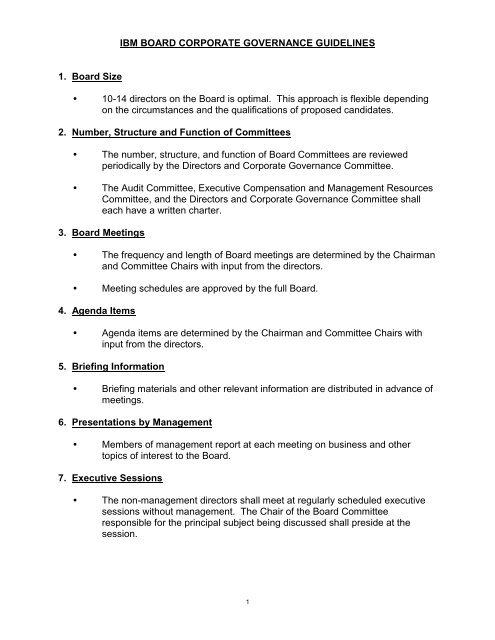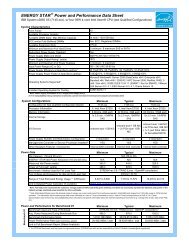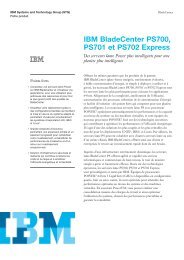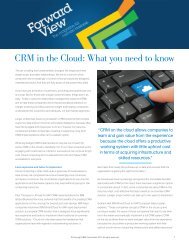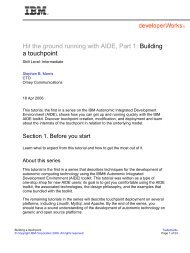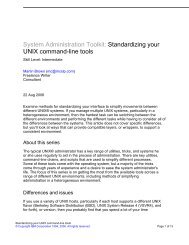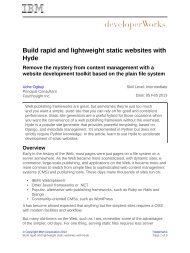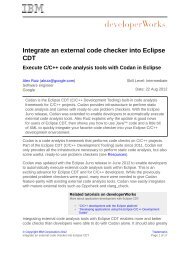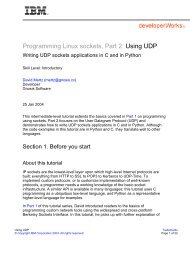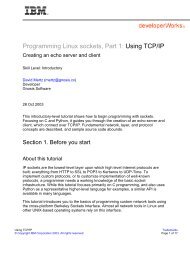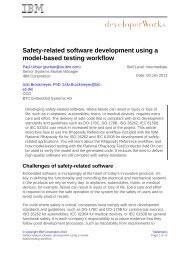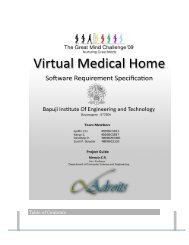IBM BOARD CORPORATE GOVERNANCE GUIDELINES 1. Board ...
IBM BOARD CORPORATE GOVERNANCE GUIDELINES 1. Board ...
IBM BOARD CORPORATE GOVERNANCE GUIDELINES 1. Board ...
Create successful ePaper yourself
Turn your PDF publications into a flip-book with our unique Google optimized e-Paper software.
<strong>1.</strong> <strong>Board</strong> Size<br />
<strong>IBM</strong> <strong>BOARD</strong> <strong>CORPORATE</strong> <strong>GOVERNANCE</strong> <strong>GUIDELINES</strong><br />
� 10-14 directors on the <strong>Board</strong> is optimal. This approach is flexible depending<br />
on the circumstances and the qualifications of proposed candidates.<br />
2. Number, Structure and Function of Committees<br />
� The number, structure, and function of <strong>Board</strong> Committees are reviewed<br />
periodically by the Directors and Corporate Governance Committee.<br />
� The Audit Committee, Executive Compensation and Management Resources<br />
Committee, and the Directors and Corporate Governance Committee shall<br />
each have a written charter.<br />
3. <strong>Board</strong> Meetings<br />
� The frequency and length of <strong>Board</strong> meetings are determined by the Chairman<br />
and Committee Chairs with input from the directors.<br />
� Meeting schedules are approved by the full <strong>Board</strong>.<br />
4. Agenda Items<br />
� Agenda items are determined by the Chairman and Committee Chairs with<br />
input from the directors.<br />
5. Briefing Information<br />
� Briefing materials and other relevant information are distributed in advance of<br />
meetings.<br />
6. Presentations by Management<br />
� Members of management report at each meeting on business and other<br />
topics of interest to the <strong>Board</strong>.<br />
7. Executive Sessions<br />
� The non-management directors shall meet at regularly scheduled executive<br />
sessions without management. The Chair of the <strong>Board</strong> Committee<br />
responsible for the principal subject being discussed shall preside at the<br />
session.<br />
1
<strong>IBM</strong> <strong>BOARD</strong> <strong>CORPORATE</strong> <strong>GOVERNANCE</strong> <strong>GUIDELINES</strong><br />
8. Reports by the Committees to the <strong>Board</strong><br />
� The Committees regularly report to the <strong>Board</strong> on their proceedings and<br />
deliberations. The Committees also bring to the <strong>Board</strong> for consideration<br />
those matters and decisions which the Committees judge to be of special<br />
significance.<br />
9. Director Qualifications, Responsibilities, Orientation and Continuing<br />
Education<br />
� Director qualifications are reviewed by the Directors and Corporate<br />
Governance Committee and subsequently by the <strong>Board</strong> in connection with<br />
the nomination of candidates for election at the annual meeting.<br />
� <strong>IBM</strong>’s business is managed under the direction of the <strong>Board</strong> of Directors.<br />
Directors are expected to invest the time and effort necessary to understand<br />
the Company’s business and financial strategies and challenges. The basic<br />
duties and responsibilities of the directors include attending <strong>Board</strong> meetings,<br />
preparing for meetings by advance review of any meeting materials and<br />
actively participating in <strong>Board</strong> discussions. Directors are also expected to<br />
make themselves available outside of <strong>Board</strong> meetings for advice and<br />
consultation.<br />
� The Corporate Secretary is responsible for providing orientation materials to,<br />
and scheduling orientation sessions for, new directors. The Corporate<br />
Secretary will also work with the Chairman and Committee Chairs as<br />
necessary to periodically provide materials and other guidance that would<br />
assist directors with their continuing education.<br />
10. Candidates<br />
� The Directors and Corporate Governance Committee identifies and<br />
evaluates proposed candidates for addition to the <strong>Board</strong>, including<br />
candidates proposed by third parties. Invitations to new directors are<br />
authorized by the <strong>Board</strong>.<br />
� Individuals are selected to join the <strong>Board</strong> based on their business or<br />
professional experience, the diversity of their background, and their array of<br />
talents and perspectives.<br />
2
<strong>IBM</strong> <strong>BOARD</strong> <strong>CORPORATE</strong> <strong>GOVERNANCE</strong> <strong>GUIDELINES</strong><br />
1<strong>1.</strong> Director Independence<br />
� The <strong>Board</strong> shall be composed of a majority of independent directors.<br />
� The Audit Committee, Executive Compensation and Management Resources<br />
Committee, and Directors and Corporate Governance Committee shall be<br />
composed entirely of independent directors.<br />
� The Directors and Corporate Governance Committee and the full <strong>Board</strong><br />
annually review the financial and other relationships between the nonmanagement<br />
directors and <strong>IBM</strong>. The Directors and Corporate Governance<br />
Committee makes recommendations to the <strong>Board</strong> about the independence of<br />
non-management directors, and the <strong>Board</strong> determines whether such<br />
directors are independent.<br />
� Appendix A sets forth the independence criteria established by the <strong>Board</strong><br />
and used by the Directors and Corporate Governance Committee and the<br />
<strong>Board</strong> in their assessment of the independence of directors.<br />
12. Change in Position<br />
� Each director will tender his or her resignation upon a change in position or<br />
responsibility in his or her principal occupation, subject to review by the<br />
Directors and Corporate Governance Committee and the <strong>Board</strong>. If approved<br />
by the <strong>Board</strong>, the director may continue to serve for up to three years after<br />
the change in position or responsibility. Continued service beyond this<br />
period will be subject to review by the Directors and Corporate Governance<br />
Committee and the <strong>Board</strong>.<br />
� Employee directors are required to resign upon leaving the Company,<br />
subject to review by the Directors and Corporate Governance Committee and<br />
the <strong>Board</strong>.<br />
13. Retirement Age<br />
� Non-management directors shall not stand for reelection at the first annual<br />
meeting following age 72, subject to review by the Directors and Corporate<br />
Governance Committee and the <strong>Board</strong>.<br />
14. Director Compensation and Stock Ownership<br />
� Director compensation and stock ownership are periodically reviewed by the<br />
Directors and Corporate Governance Committee, usually on an annual basis.<br />
3
<strong>IBM</strong> <strong>BOARD</strong> <strong>CORPORATE</strong> <strong>GOVERNANCE</strong> <strong>GUIDELINES</strong><br />
� The Committee’s review includes a comparison of <strong>IBM</strong>'s director<br />
compensation practices against the practices of the largest U.S. companies.<br />
The Committee's objectives include ensuring that the Company’s nonmanagement<br />
directors have a proprietary stake in the Company and that the<br />
interests of the directors continue to be closely aligned with the interests of<br />
the Company’s stockholders.<br />
� Within 5 years of initial election to the <strong>Board</strong>, each non-management director<br />
is expected to have stock-based holdings in <strong>IBM</strong> equal in value to 5 times the<br />
annual retainer initially payable to such director. In the event of an increase<br />
in annual retainer, the Committee will review the need for an increase in<br />
directors' stock-based holdings.<br />
15. <strong>Board</strong> and Committee Self-Evaluation<br />
� The <strong>Board</strong> evaluates its performance regularly in executive session. The<br />
<strong>Board</strong> shall conduct these evaluations at least annually.<br />
� Each Committee shall also conduct an evaluation of its performance at least<br />
annually.<br />
16. Access to Senior Management and Independent Advisors<br />
� Management is available to discuss matters of concern to directors and<br />
directors have regular access to senior management.<br />
� The <strong>Board</strong> may retain independent advisors as it deems appropriate in its<br />
discretion.<br />
17. Interaction with Third Parties<br />
� Management is the primary voice of the Company.<br />
18. Evaluation of the CEO<br />
� The performance of the CEO is reviewed periodically by the Executive<br />
Compensation and Management Resources Committee and annually by the<br />
<strong>Board</strong> in executive session.<br />
19. Management Resources and Succession<br />
� The Chairman reports regularly on succession planning and management<br />
development. The <strong>Board</strong>’s practice is to conduct an annual review.<br />
4
<strong>IBM</strong> <strong>BOARD</strong> <strong>CORPORATE</strong> <strong>GOVERNANCE</strong> <strong>GUIDELINES</strong><br />
Appendix A. Independence Standards<br />
A director is considered independent if the <strong>Board</strong> makes an affirmative determination<br />
after a review of all the relevant information that the director has no material relationship<br />
with the Company. The <strong>Board</strong> has established the following standards to assist it in<br />
assessing director independence.<br />
<strong>1.</strong> A director will not be considered independent if:<br />
i. The director is, or has been within the last three years, an employee of the<br />
Company, or an immediate family member is, or has been within the last three years, an<br />
executive officer, of the Company;<br />
ii. The director has received, or has an immediate family member who has<br />
received, during any twelve-month period within the last three years, more than<br />
$100,000 in direct compensation from the Company, other than director and committee<br />
fees and pension or other forms of deferred compensation for prior service (provided<br />
such compensation is not contingent in any way on continued service). Compensation<br />
received by an immediate family member for service as an employee of the Company<br />
(other than an executive officer) does not preclude a determination of independence for<br />
the director;<br />
iii. (A) The director or an immediate family member is a current partner of a<br />
firm that is the Company’s internal or external auditor; (B) the director is a current<br />
employee of such a firm; (C) the director has an immediate family member who is a<br />
current employee of such a firm and who participates in the firm’s audit, assurance or<br />
tax compliance (but not tax planning) practice; or (D) the director or an immediate family<br />
member was within the last three years (but is no longer) a partner or employee of such<br />
a firm and personally worked on the Company's audit within that time;<br />
iv. The director or an immediate family member is, or has been within the last<br />
three years, employed as an executive officer of another company where any of the<br />
Company's present executive officers at the same time serves or served on that<br />
company’s compensation committee; or<br />
v. The director is a current employee, or an immediate family member is a<br />
current executive officer, of a company that has made payments to, or received<br />
payments from, the Company for property or services in an amount which, in any of the<br />
last three fiscal years, exceeds the greater of $1 million, or 2% of such other company’s<br />
consolidated gross revenues;<br />
in each case in accordance with the corporate governance standards of, and any<br />
related commentary and guidance from, the New York Stock Exchange.<br />
5
<strong>IBM</strong> <strong>BOARD</strong> <strong>CORPORATE</strong> <strong>GOVERNANCE</strong> <strong>GUIDELINES</strong><br />
2. Relationships of the following types will not be considered material relationships<br />
that would impair a director's independence:<br />
i. Payments between the Company and any other company at which a<br />
director is a current employee or an immediate family member of a director is a current<br />
executive officer, if such payments are less than the threshold set forth above in Section<br />
1(v);<br />
ii. Contributions by the Company to any tax exempt organization at which a<br />
director serves as an executive officer, director, trustee or equivalent, if within the<br />
preceding three years, such contributions did not exceed the greater of $1 million or 2%<br />
of such organization's consolidated gross revenues;<br />
iii. Relationships between any extended family member of a director (i.e., not<br />
an immediate family member) and the Company or its external auditor;<br />
iv. Membership in, or association with, the same professional association,<br />
social, educational, fraternal or religious organization, club or institution, as an executive<br />
officer or another director of the Company;<br />
v. Service on the board of another company at which an executive officer or<br />
another director of the Company also serves as a board member, except as set forth in<br />
Section 1(iv) above; and<br />
vi. Employment by a director at another company, or service on the board of<br />
another company by a director, where the external auditor for such other company is<br />
also the external auditor for the Company.<br />
Immediate Family Member. An “immediate family member” includes a director's<br />
spouse, parents, children, siblings, mothers and fathers-in-law, sons and daughters-inlaw,<br />
brothers and sisters-in-law, and anyone (other than domestic employees) who<br />
shares the director's home.<br />
November 14, 2008<br />
6


